Reform plan for China’s state firms boosts investors' confidence, but questions remain
Some analysts question whether mergers will boost productivity at the notoriously inefficient SOEs

China’s planned reforms, which are likely to involve mergers between major state-owned enterprises (SOEs) in sectors including power, energy, and shipping, have helped the stock market to soar in the past few weeks as investors anticipate stronger – and hopefully more profitable – state giants.
However, some analysts and industry players remain unconvinced that these reforms will boost productivity at SOEs, which are known for their poor levels of efficiency.
They also questioned whether the reforms might lower the threshold for small- and medium-sized enterprises (SMEs) to enter the lucrative industries that have long been dominated by state giants, or rather put their expansion and survival at greater risk.
“There’s no direct link between mergers of SOEs and the pledged reforms of the state system: the signals sent out so far are troubling,” said Gary Liu, executive deputy director of the Shanghai-based CEIBS Lujiazui Institute of International Finance.
”Mergers among central SOEs might harm the economy in the long run despite some short-term benefits. It might mean more [state] monopolies, lower efficiency, and setbacks for the planned market-oriented reforms,” he warned.
The Politburo, China’s core decision-making body, issued a statement following a meeting last Thursday, saying that the direction of reforms of SOEs remained unchanged, while the interests of private enterprises would be legally protected. But it did not provide any details.
